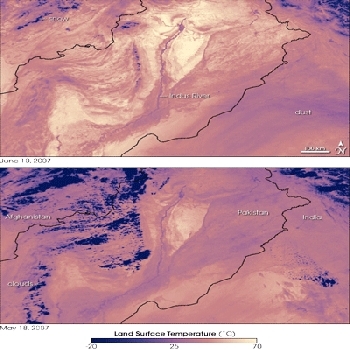Heat Waves (main)
From The Encyclopedia of Earth
Heat Waves
Pakistan was in the midst of a deadly heat wave on June 10, 2007 when NASA’s Terra satellite captured the top image that shows how hot the land would feel to the touch.
Jesse Allen NASA
========
-
 Featured Article
Featured Article  Humans and Heat WavesAs global maximum temperatures rise, heat waves are becoming more pronounced. Europe experienced the hottest summer on record in 2003, with average temperatures 3.5°C above... More »
Humans and Heat WavesAs global maximum temperatures rise, heat waves are becoming more pronounced. Europe experienced the hottest summer on record in 2003, with average temperatures 3.5°C above... More »
Recently Updated
 Climate Change and Unprepared Cities Last Updated on 2011-04-09 00:00:00 Climate Change Poses Major Risks for Unprepared Cities Fast-growing urban areas most likely to feel the heat Cities worldwide are failing to take necessary steps to protect residents from the likely impacts of climate change, even though billions of urban dwellers are vulnerable to heat waves, sea level rise and other changes associated with warming temperatures. A new examination of urban policies by Patricia Romero Lankao at the National Center for Atmospheric Research (NCAR) in Boulder, Colo., in conjunction with an international research project on cities and climate change, warns that many of the world's fast-growing urban areas, especially in developing countries, will likely suffer disproportionately from the impacts of changing climate. Her work also concludes that most cities are failing to reduce emissions of carbon dioxide and other greenhouse gases that... More »
Climate Change and Unprepared Cities Last Updated on 2011-04-09 00:00:00 Climate Change Poses Major Risks for Unprepared Cities Fast-growing urban areas most likely to feel the heat Cities worldwide are failing to take necessary steps to protect residents from the likely impacts of climate change, even though billions of urban dwellers are vulnerable to heat waves, sea level rise and other changes associated with warming temperatures. A new examination of urban policies by Patricia Romero Lankao at the National Center for Atmospheric Research (NCAR) in Boulder, Colo., in conjunction with an international research project on cities and climate change, warns that many of the world's fast-growing urban areas, especially in developing countries, will likely suffer disproportionately from the impacts of changing climate. Her work also concludes that most cities are failing to reduce emissions of carbon dioxide and other greenhouse gases that... More »  Humans and Heat Waves Last Updated on 2010-12-16 00:00:00 As global maximum temperatures rise, heat waves are becoming more pronounced. Europe experienced the hottest summer on record in 2003, with average temperatures 3.5°C above normal. [1] During a 2-week period in August 2003, between 30,899 and 49,004 Europeans died from heat-related causes. Mortality was highest among the old, chronically ill, and isolated. [2] Was this a natural disaster, independent from human activities? Simulations run on the HadGCM3 global climate model indicate that human-induced climate change more than doubled the risk of such an event in 2003. [3] Under the warming anticipated during the next 40 years, similar heat waves will be 100 times more likely to occur. Climate models also predict that California will experience more severe heat waves. From 1961 to 1990, an average of 165 people in Los Angeles died each year from heat-related causes. A... More »
Humans and Heat Waves Last Updated on 2010-12-16 00:00:00 As global maximum temperatures rise, heat waves are becoming more pronounced. Europe experienced the hottest summer on record in 2003, with average temperatures 3.5°C above normal. [1] During a 2-week period in August 2003, between 30,899 and 49,004 Europeans died from heat-related causes. Mortality was highest among the old, chronically ill, and isolated. [2] Was this a natural disaster, independent from human activities? Simulations run on the HadGCM3 global climate model indicate that human-induced climate change more than doubled the risk of such an event in 2003. [3] Under the warming anticipated during the next 40 years, similar heat waves will be 100 times more likely to occur. Climate models also predict that California will experience more severe heat waves. From 1961 to 1990, an average of 165 people in Los Angeles died each year from heat-related causes. A... More » 